LATEST NEWS


If you’re wondering what all the fuss is about down at the ports of L.A. and Long Beach, where drivers have been on an Unfair Labor Practice strike since Monday, think Nike during the 1990s. Remember the barrage of news stories and reports about the horrendous conditions endured by workers at plants run by Nike contractors? Remember how the company tried for years to distance itself from the practice of its contractors, even though it had the power all along to put an end to the exploitation?
The same story is unfolding right now in Southern California, where multinational retailers are refusing to take responsibility for the egregious abuses of their contractors. A case in point is Skechers, which recently supplanted New Balance as the nation’s fifth-largest athletic footwear brand.
Based in Manhattan Beach, Skechers is experiencing enormous growth in sales and profits. In the first quarter of 2014,
» Read more about: Skechers’ Labor Troubles: A Nike for the 21st Century »


California Tax Breaks — What’s Wrong With This Picture?
Amid continued squabbling over whether to boost the California film and television production tax incentive program, the state legislature just handed aerospace giant Lockheed Martin Corp. a whopping $420-million tax break.
Yes, you read that right: A bill creating a 15-year sweetheart deal — for a single private company — sails through the Assembly and Senate without a hitch, yet the fate of Assembly Bill 1839, which would enhance California’s existing entertainment tax credit program and generate millions in additional revenue, continues to face opposition in Sacramento.
What’s wrong with this picture?
It should be a no-brainer that, in order to remain competitive in the global market for film and television production and post-production work, California needs to boost its incentive program. Once the epicenter for entertainment production, California no longer assumes this leadership position.
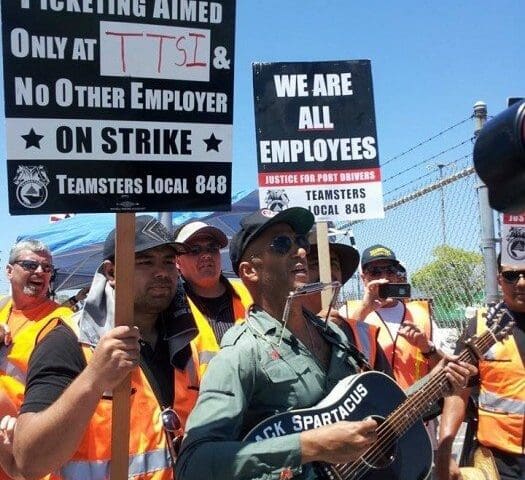
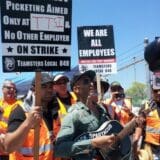
One hundred twenty truck drivers who haul freight to and from the twin ports of Los Angeles and Long Beach went on strike Monday against the three companies they work for. The work stoppage, which has no announced end date, was called to protest alleged retaliation by Green Fleet Systems, Total Transportation Services Inc. and Pacific 9 Transportation, as well as the drivers’ long hours and low wages. Perhaps more important, the strikers are motivated by their determination to end the companies’ practice of classifying drivers as “independent contractors” – a status that allows the firms to treat their workers as second-class citizens and to avoid contributing payroll taxes to the state and federal governments.
On Wednesday rock-and-protest icon Tom Morello showed up on Terminal Island to support the strikers. The Rage Against the Machine guitarist and Watchman singer strummed a guitar labeled “Black Spartacus”
» Read more about: Scenes From the Port Truck Driver Strike: Tom Morello Performs »
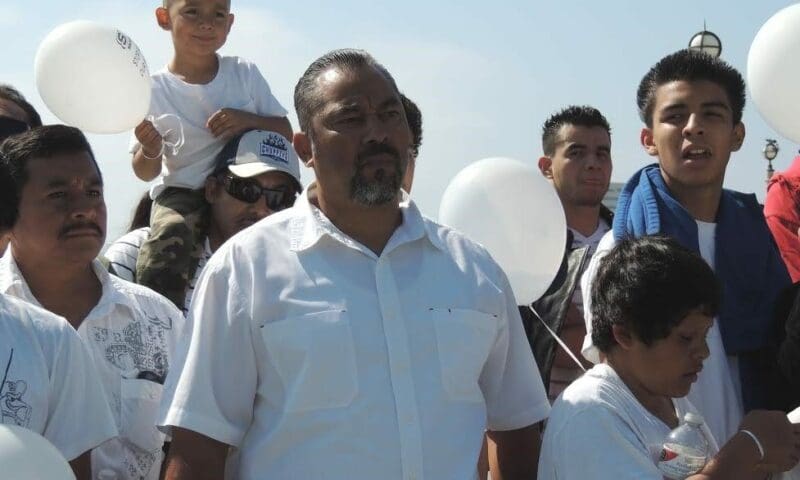

Byron Contreras has seen almost everything in his 15 years as a truck driver, but there’s one thing he’s still looking for – respect.
That word comes up repeatedly in a conversation with Contreras, an employee of Green Fleet Systems who, along with 120 other drivers, walked off the job Monday, slowing down operations at the nation’s largest port complex. The drivers and a small army of supporters have been picketing the yards of Green Fleet, Total Transportation Services Inc. and Pacific 9 Transportation, as well as marine terminals at the Ports of L.A. and Long Beach.
The strike – the fourth one in the last year involving local port truck drivers – comes as the port trucking industry continues to reel from a string of devastating decisions by courts and government agencies. These rulings have confirmed what critics have been saying for years – that the mistreatment of truck drivers is not only immoral,
» Read more about: Wheel Man: Interview With a Striking Port Truck Driver »
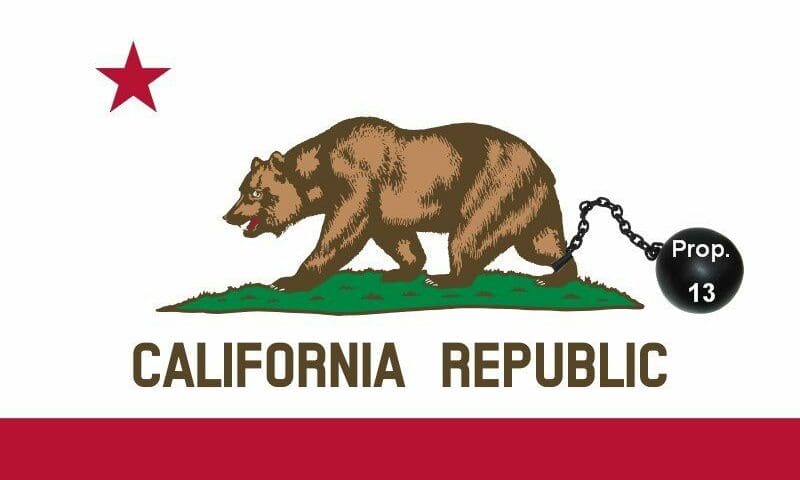
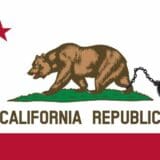
Who ate the California Dream? Why is the state that once led the nation in education now at the bottom? Why is the state that pioneered infrastructure miracles at war over building a bullet train or shoring up the levees in the Sacramento/San Joaquin River Delta? Why has our state been a fiscal shambles for most of the past dozen years? What brought our Golden State to its knees?
Some might conjecture about the focus on prison construction that dominated a couple of decades of state budgets or the Great Recession’s deficit years. Some people blame public sector unions and their members’ retirement funds. But to really understand what happened to California, you have to go back further, to 1978 and the passage of Proposition 13.
Oops, we just touched the “third rail” of state politics, so let me offer this caveat. The residential property tax limits installed by the passage of Prop.
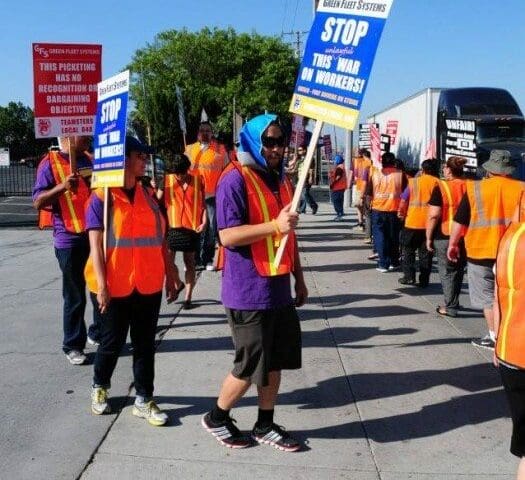
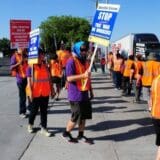
One hundred twenty truck drivers who haul freight to and from the twin ports of Los Angeles and Long Beach went on strike Monday against the three companies they work for. The work stoppage, which has no announced end date, was called to protest alleged retaliation by Green Fleet Systems, Total Transportation Services Inc. and Pacific 9 Transportation, as well as the drivers’ long hours and low wages. Perhaps more important, the strikers are motivated by their determination to end the companies’ practice of classifying drivers as “independent contractors” – a status that allows the firms to treat their workers as second-class citizens and to avoid contributing payroll taxes to the state and federal governments.
Today workers at the Port of Savannah, Georgia also threw up picket lines to protest similar treatment by local trucking companies. According to WJCL TV, Teamsters Local Union 728 “has called on the Georgia Ports Authority to come out publicly condemning the classification of port truck drivers as contract employees rather than full-time.”
» Read more about: Scenes From the Port Truck Driver Strike »
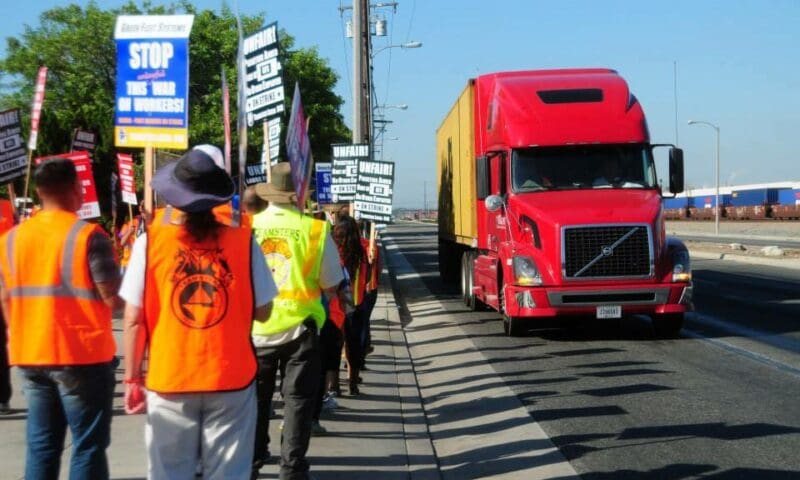
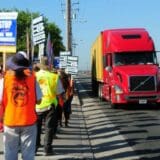
For the fourth time within the past year, port truck drivers have struck short-distance hauling companies over a list of unfair labor practices that include low pay and the endemic misclassification of drivers as “independent contractors.” Misclassification has condemned drayage employees who work at the Ports of Los Angeles and Long Beach to a status of modern serfdom. Port drivers often work 16 hours a day and are financially responsible for the fueling and upkeep of their high-maintenance vehicles – yet their take-home checks can amount to less than minimum wage, thanks to company deductions that charge drivers for everything from gas to insurance.
The strike began early Monday, when drivers who work for Green Fleet Systems (GFS), Total Transportation Services, Inc. (TTSI) and Pacific 9 Transportation (Pac 9) began picketing the companies’ truck yards, as well as the marine terminals of the two giant ports, which receive 40 percent of the nation’s imports.
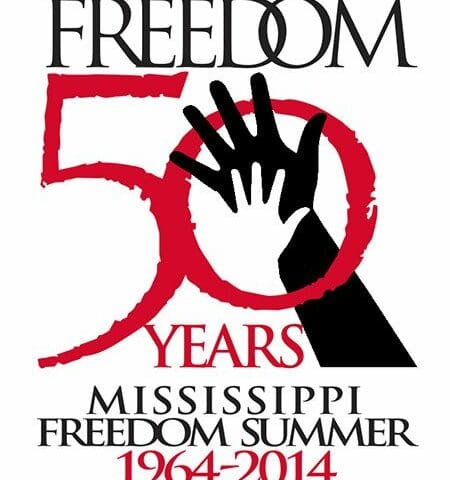

“When you’re in Mississippi the rest of America doesn’t seem real. And when you’re in the rest of America, Mississippi doesn’t seem real. ”
— Bob Moses, Mississippi Freedom Summer Director
The Mississippi Freedom Summer project of 1964 was born of necessity. The ranks of civil rights workers in the state were being devastated and the nation needed to pay attention. The proposal to bring hundreds of college students into Mississippi for the summer to work as voter registration and Freedom School volunteers was controversial. Opponents worried that the mostly white students didn’t know the state, might distract from building grassroots leadership and could provoke even more retaliation from Mississippi segregationists. But according to civil rights veterans who convened the 50th Anniversary gathering of Mississippi Freedom Summer in Jackson this past June, it was the local leaders, like former sharecropper Fannie Lou Hamer, who strongly supported the idea.
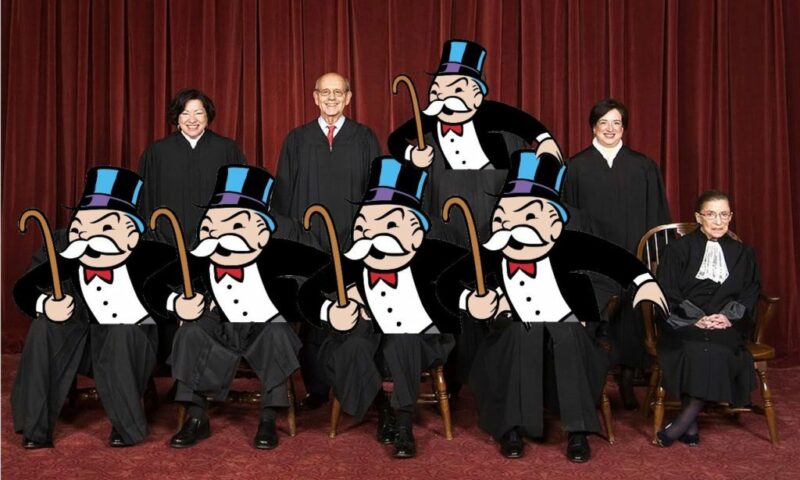

“It’s always darkest before the dawn” sang Pete Seeger. “And that’s what keeps me moving on.”
The recent spate of reactionary decisions by the Roberts Supreme Court — including this week’s outrageous Hobby Lobby ruling — triggers thoughts of a better day, when the right-wingers on the court will have retired or died, replaced by thoughtful liberals who will restore some semblance of fairness and democracy to this great country. Let’s consider what it would be like if our nation’s highest court was actually committed to the notion of “liberty and justice for all.”
Doing so requires making a few leaps of faith, but none of them are far-fetched. It depends on the outcome of the next few election cycles.
If the Democrats retain a majority in the Senate after this November, the feisty, brilliant Ruth Bader Ginsburg, now 81 years old, should retire so Obama can appoint another (younger) liberal member who will have a long tenure on the court.
Film director Randall Miller (Bottle Shock), along with Jody Savin and Jay Sedrish, the producers of the ill-fated Gregg Allman biopic, Midnight Rider, have been indicted on charges of involuntary manslaughter and criminal trespass, the Hollywood Reporter and other sources reported Thursday morning. The charges were filed in a superior court in the state of Georgia, where a February 20 accident killed camera assistant Sarah Jones.
The 27-year-old Jones’ death occurred when a freight train unexpectedly rolled through a scene being staged on railroad tracks in the small town of Doctortown Landing. Her death, which became a cause celebre among Hollywood safety activists, threw a spotlight on the dangers faced by below-the-line crew members as production companies large and small have taken shortcuts to keep down costs. With producers – particularly those involved in reality TV shows –increasingly adopting an accidents-will-happen attitude toward the safety of their crews,

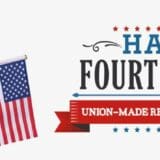
Our friends at Labor 411 continue to offer ways to celebrate holidays and support good American jobs at the same time. This week, of course, the 411 folks are highlighting the Fourth of July. They begin with Old Glory itself – noting that of all the flag versions (foreign and domestic) sold in America, you can’t do better than ones produced by the union workers of Annin Flagmakers (United Food and Commercial Workers) or Artflag (Workers United).
Doubling down on the red, white and blue spirit, Labor 411 suggests stocking up on like-colored edibles, quaffables and utensils, including:
Red: Solo Cups, Red Vines, Coca-Cola, Wine (C.K. Mondavi, Gallo Estate, Turning Leaf), Salsa (Old El Paso, Tostitos, Pace)
White: Popcorn (Act II, Orville Redenbacher, Smartfood), Domino Sugar, Chicken (Foster Farms, Banquet, Tyson), Milk (Alta Dena, Darigold, Horizon)
Blue: Pepsi,
» Read more about: Flagonomics — Supporting Good Jobs With Your Fourth of July Dollars »
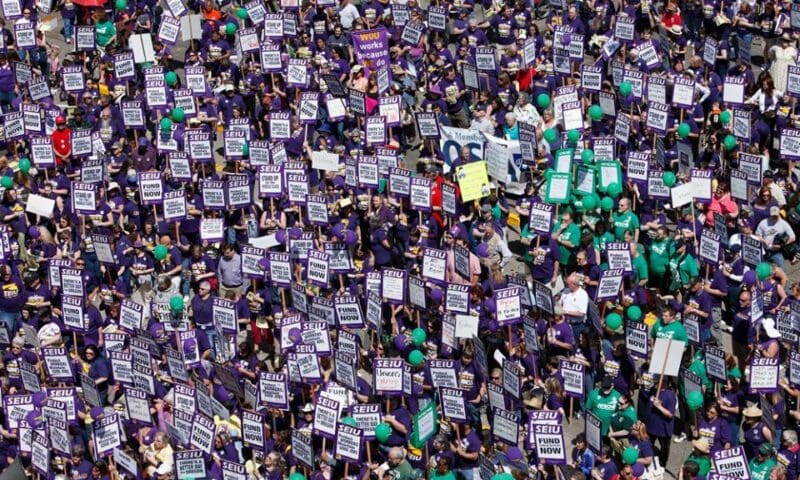
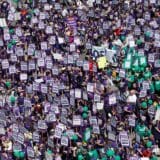
In Harris v. Quinn, the Supreme Court held by a 5-4 margin that an “agency shop” requirement—under which unionized public employees must pay their fair share of the costs of negotiating and administering a collective-bargaining agreement whose benefits they enjoy—may not be imposed on homecare workers who are (in the conservative majority’s view) only tenuously employed by the State of Illinois. Doing so, the conservatives held, violates the First Amendment.
The decision creates real obstacles for homecare workers in Illinois, California and other states who wish to have well-funded, effective unions representing them (and who don’t want to have their colleagues free-ride on the dues they pay to support such unions). This was a serious blow for homecare workers, but the obstacles are ones that can be overcome.
The bigger story of Harris v. Quinn is what didn’t happen: the conservative justices did not end fair-share fee arrangements altogether for public-sector workers.
» Read more about: Why Harris v. Quinn Is No Sweeping Victory for Conservatives »


Technology is radically transforming the ways we work and the ways we learn, nowhere more so than in the world of online education. But will the shape of the future be drawn solely by corporate leaders in the technology industry, or will parents, students and teachers have a voice in what tomorrow’s digital classroom looks like?
As the online education sector grows, the public’s stake in that question becomes ever more paramount. One way in which virtual teachers are seeking to ensure that the pursuit of profits does not come at the expense of students, parents and educators is by organizing to join the California Teachers Association. (Disclosure: CTA is a financial supporter of Capital & Main).
Below is the first in our series of posts written by teachers at the California Virtual Academies (CAVA), an affiliate of K12, a for-profit,
» Read more about: Lesson Plan: Protecting Students In Online Schools »
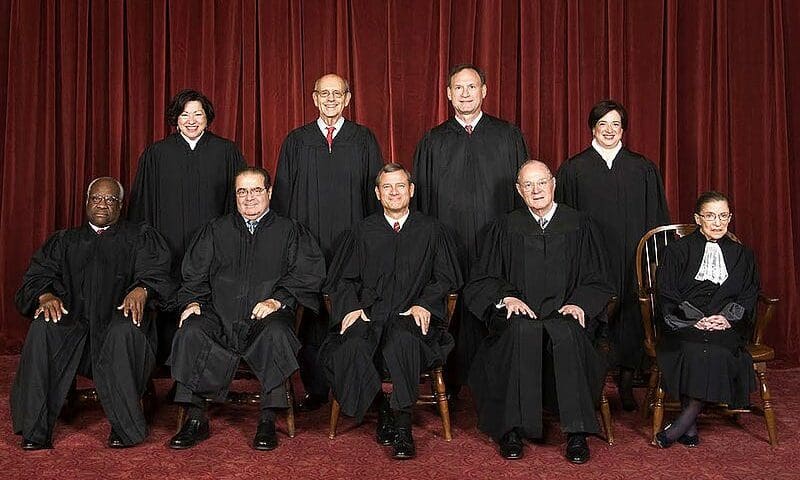

(Editor’s Note: Richard Kirsch’s feature first appeared on the Roosevelt Institute’s Next New Deal blog, as well as on Huffington Post. It is cross-posted here with the author’s permission.)
A huge sigh of relief mixed with curses. That’s my reaction to the Supreme Court’s decision today to block home care workers in Illinois from being required to pay union dues, while continuing to allow public employee unions to collect dues from all the workers they represent. The decision in Harris v. Quinn blocks the right-wing assault against one of the most important pillars of progressive infrastructure, public employee unions, but will add to the challenge of raising wages and benefits in the surging low-wage workforce.
First, some background on the case: As part of the right’s ongoing attack on working people, a right-wing legal group recruited a handful of home care workers in Illinois to challenge the state’s requirement that the workers pay union dues.
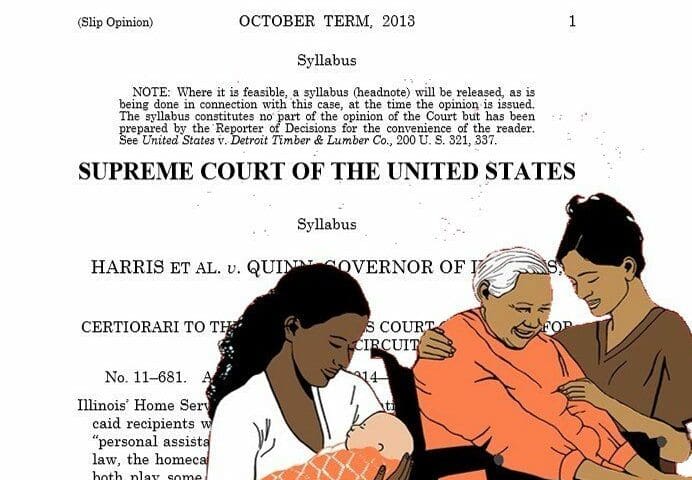
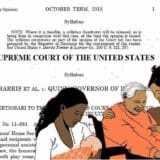
Monday’s U.S. Supreme Court ruling in Harris v. Quinn, which settled an Illinois lawsuit filed by the National Right to Work Foundation, did not strike down the ability of all public employee unions to collect fees from workers. It did, however, appear to create a new class of worker – the “partial public employee” – that could seriously hinder those unions’ organizing efforts.
While it remains to be seen exactly how the court’s decision will play out in the months to come, California in-home caregivers and organizations that represent them and their clients vowed today to carry on with their work. On a teleconference held within hours of the court’s ruling, representatives of unions and care recipients spoke of the importance of unions in the transmission of home health care.
“Homecare workers are a classic example of a workforce that needs to bargain collectively,” said Gary Passmore,
» Read more about: After the Harris Ruling: Home-Care Workers Will Continue to Organize »


In a closely watched decision, the U.S. Supreme Court this morning ruled that home-care workers cannot be compelled to pay fees to the unions that represent them. The ruling in the Harris v. Quinn case was narrow in its scope — there had been speculation that a majority of the justices could throw out the high court’s 1977 Abood decision that had authorized all public-sector unions to collect dues from workers for whom the unions negotiated contracts.
According to the Los Angeles Times:
In a 5-4 ruling written [by] Justice Samuel A. Alito Jr., the court said these employees, some of whom care for their disabled children at home, have a constitutional right not to support a union they oppose. The decision is a victory for the National Right to Work Foundation, which took up the cause of several mothers who objected to paying union fees.


Imagine walking outside and breathing fresh air instead of today’s exhaust. Imagine taking your lunch scraps to a compost bin while a modern trash truck makes its way down your street. And then imagine the convenience of tossing your recyclables into a blue bin, and knowing that this has lowered your trash bill while helping the environment.
Los Angeles is on track to becoming a national environmental leader with its landmark Zero Waste LA system, which covers waste and recycling collection for apartments and businesses. In April, the Zero Waste LA policy was adopted by Los Angeles’ City Council. The system will carve out 11 exclusive waste franchise zones that will reduce truck traffic and increase recycling and composting – with three of the zones designed to incubate small waste haulers’ growing businesses and protecting long-term competition.
The next step — the Request for Proposals, or RFP — was just approved by the Board of Public Works on June 11,
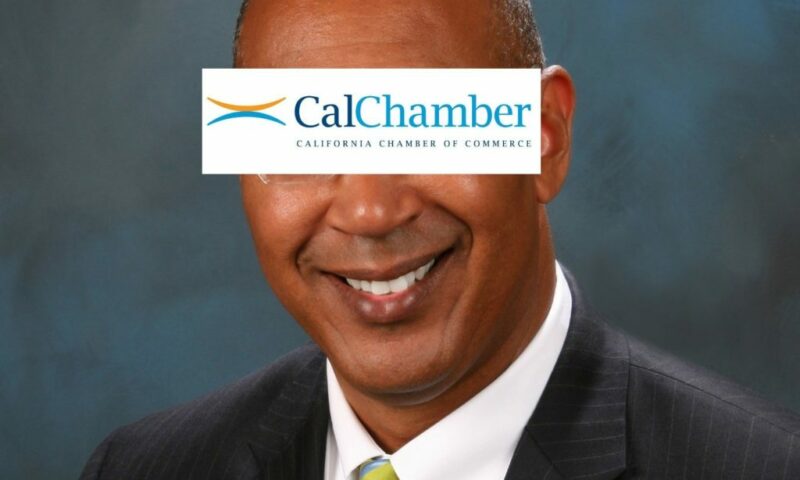
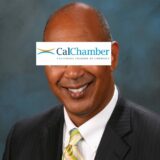
On Wednesday, Assemblymember Chris Holden (D-Pasadena) thwarted an effort to raise California’s minimum wage. By abstaining, he helped kill a proposal to raise the wage to $13 an hour in 2017.
Many of Holden’s constituents are wondering: Why? Is Holden one of those “corporate Democrats” that Pulitzer Prize-winning journalist Gary Cohn has recently exposed in eye-opening reports? Although Holden often supports pro-union bills, he typically looks to find pro-business compromises to secure his “yes” vote on labor-oriented legislation. His abstention on the minimum wage bill was a “big disappointment,” according to a key union activist in Sacramento.
Across the country, there’s a growing movement to address the nation’s widening economic inequality. One key part of this movement is the accelerating wave of cities and states seeking to raise the minimum wage. President Obama has proposed raising the federal minimum wage to $10.10 an hour.
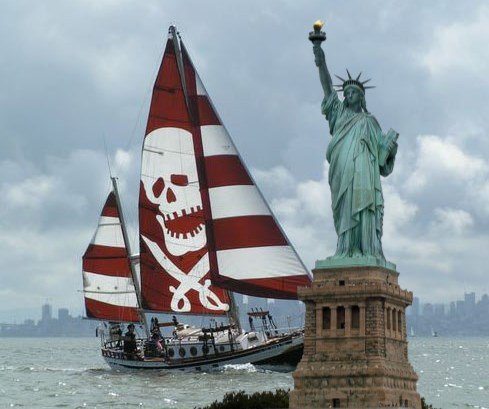

“In states and cities across the country, lawmakers are expressing new skepticism about privatization, imposing new conditions on government contracting, and demanding more oversight.”
— The Atlantic, 4/23/14
“Is privatization a magic wand? Is it always going to come in and save you money? No. You have to do this well. You have to do your due diligence. You have to do a good contract and then you have to monitor and enforce that contract.”
— Leonard Gilroy, Reason Foundation Director of Government Reform
“The ideological fervor for privatization has ebbed.”
— John D. Donahue, privatization expert, Harvard’s Kennedy School of Government
Statements like these would have been unthinkable just a few years ago. For decades, runaway outsourcing of public services and assets enjoyed nearly nonstop momentum at the state and local levels. But when even the Reason Foundation is agreeing with us about responsible contracting,
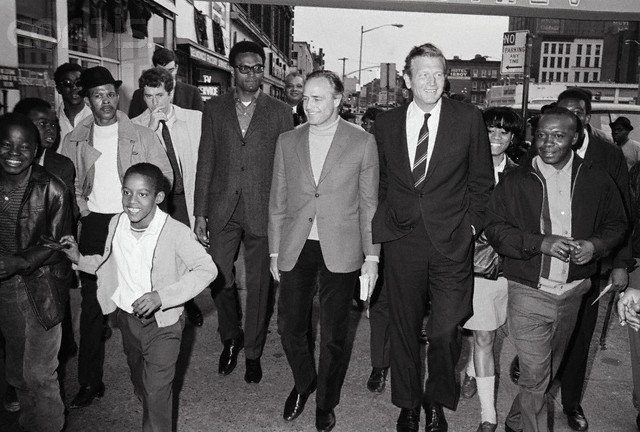
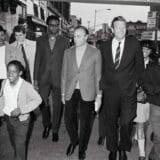
“The enemy of the actor is the mind,” Marlon Brando once wrote in notes he compiled for a 2001 series of acting seminars that he planned to film and distribute under the title, “Lying for a Living.”
Brando, of course, meant that in performance, acting is an emotional rather than intellectual activity. But according to Brando’s Smile: His Life, Thought, and Work, Susan Mizruchi’s engaging, insightful and rigorously researched new biography of the man universally acclaimed as the 20th century’s greatest actor, understanding the often antagonistic dichotomy between a capacious intellect and a vast, intuitive talent goes a long way to cracking the enduring enigma that is Marlon Brando.
“He modeled,” Mizruchi tells Capital & Main, “a kind of social activism – the idea that actors were obligated in some sense to use their fame to help others.”
By the late ’60s, however, the actor’s reputation was in decline.